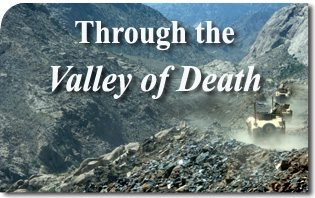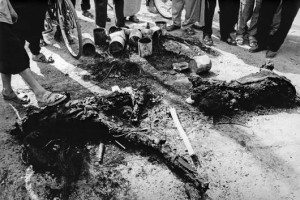 Once in a while a story of heroism comes along which leaves us speechless. This is the case when one hears the deeds of Marine Sergeant Jeremiah Workman. On December 23, 2004, he was a squad leader clearing houses in Fallujah, Iraq, when a group of fellow Marines were ambushed and penned down in a house across the street. The enemy was entrenched on the upper floor with machine guns, AK-47’s and M-16s.
Once in a while a story of heroism comes along which leaves us speechless. This is the case when one hears the deeds of Marine Sergeant Jeremiah Workman. On December 23, 2004, he was a squad leader clearing houses in Fallujah, Iraq, when a group of fellow Marines were ambushed and penned down in a house across the street. The enemy was entrenched on the upper floor with machine guns, AK-47’s and M-16s.
During a three-hour firefight Sergeant Workman was forced to climb two flights of stairs — on three separate occasions — to save them. He faced a nagging fear each time that “his time had come.” Yet this did not stop him from entering the proverbial “valley of death” for his fellow Marines.
The Tip of the Spear
In many ways Sergeant Workman is the paradoxical Marine. One can easily imagine him kicking down a door to face unknown danger. But his equally kind and “gentle giant” demeanor is also the type seen in Marines who give candy to a smiling Iraqi child.
When still very young, Workman was a star running back on his high school football team and a virtual celebrity in the tiny town of Richwood, Ohio. The success he achieved on the gridiron only served to fuel his quest to be the best and ultimately drove him to join the Marine Corps. He wanted to be one of the few, the proud. “In my eyes,” he said, “the Marine Corps was the elite, the tip of the spear.” 1

It did not take long for him to see how true this is when in September, 2004, he was sent to a base outside Fallujah, Iraq, one of the most dangerous cities in the country at that time. In the spring of that same year, four American contractors were killed and burned by the locals.
After dragging their charred bodies through the streets they unceremoniously hung them on the Euphrates river bridge for all to see. While this was meant to intimidate anyone attempting to tame this city, it did not touch the resolve of the men with the 3rd Battalion, 5th Marines, particularly Jeremiah Workman.
Operation Phantom Fury
In November, coalition forces launched Operation Phantom Fury as part of the Second Battle for Fallujah. This mission, led by the United States Marines, was the most intense urban combat the Corps had seen since the 1968 battle for Hue City in Vietnam. After intense air strikes, Marine infantry units moved in while Sergeant Workman’s platoon pounded an entrenched enemy with 81MM mortars.
By the middle of December they traded their mortars for rifles, Humvees, and trucks. Under the command of Major Todd Desgrosseilliers, their new job was to clear the houses of weapons, one by one. Maj. ‘D’, as his men called him, had earned a reputation for fearlessness when, only weeks before, he threw himself between one of his fellow Marines and a live grenade. 2 He would now lead 3rd Battalion, 5th Marines in one of the most violent firefights in this city.
An Ambush Inside a House in Sector 19
The work was initially boring and by the morning of December 23, 2004, the task was becoming downright tedious. On that day Marines split the platoon. A squad of ten, led by Sergeant Workman, took the right side of the street in Sector 19, while Sergeant Jarrett Kraft 3 took the left.
They found nothing in the first two houses. While searching the third, however, Jeremiah Workman distinctly heard the sound of AK-47’s coming from across the street. Grey and white smoke was billowing out the second floor window of the building occupied by Sergeant Kraft. This was the first salvo of the last firefight in the city of Fallujah.
Sergeant Workman’s squad endured enemy fire and the cross hairs of a sniper as they ran across a one hundred yard area they appropriately dubbed “no man’s land”. When they entered the house, Sergeant Kraft informed them that some of his Marines were on the second floor, locked in a hellish close-quarter combat with a determined enemy. This house, they later learned, was occupied by eight high-profile targets with personal body guards, snipers, and loads of sophisticated weaponry. As the two Marines assessed the situation, the staircase above them was being ripped to pieces by a machine gunner armed with a seemingly endless supply of ammo.
Charging the Staircase…Alone
The Marines quickly formed what is called a stack and made ready to charge up the staircase. The Marine Lieutenant in charge of the operation stepped aside at the last minute. Suddenly, Sergeant Workman was the point man faced with a painful decision. He could either let his fellow Marines die, or pass through a sheet of hot lead to save them. He chose the later and fearlessly led the charge.
With each step he took the machine gunner upstairs tore chunks of concrete off the wall. By the time he reached the first landing he noticed something wrong and looked back. He was all alone. The second Marine in the stack hesitated and caused the rest to remain frozen downstairs. “Get back down here,” the Lieutenant screamed.
Sergeant Workman was reluctant to obey the order. By now he had convinced himself that he was not going to leave this house alive. It was a realization that drove away the agonizing fear of death. Nevertheless he saw the futility of fighting this battle alone and made a hasty retreat. After reloading his weapons and organizing his men, together they made a second attempt to climb the staircase.
When they reached the landing this time, Sergeant Workman got his first glimpse inside the smoke filled room. It was then that he saw the expressionless face of his friend Corporal Raleigh Smith, who would not survive the battle.
“Give me a Pistol, I can still fight.”
By now Corporal Phillip Levine, who had already suffered a horrifying eye injury, was shot in the shoulder. He was a native of the Bronx, New York, and lost friends during 9-11. This was very personal for him and he begged to be left in the battle, even though he could no longer lift his M-16. Sergeant Workman, however, knew it was time to make another tactical retreat.
They once again made it out of the house alive. Sergeant Workman was in the middle of no man’s land on his way towards the Humvee and much needed water and medical attention for Corporal Levine when he heard a faint cry for help. When he turned around he saw a badly wounded Jerrad Hebert, barely able to walk and completely exposed to enemy fire. Forgetting his own safety, Workman summoned what little strength he had left, entered the crosshairs of a Taliban sniper and dragged the wounded Marine to safety.
Meanwhile Corporal Levine had received attention from the medic, but his only concern was getting back into that house. “Give me a pistol,” he pleaded with anyone who would listen, even though he could still not lift his arm to use it.
“I will go out hard, fighting to the end.”
It was then that Sergeant Workman looked into the bed of a truck and saw the lifeless bodies of his friends, Corporal Raleigh Smith and Lance Corporal Eric Hillenburg, who had been evacuated during the firefight. He had never seen a dead Marine; and now, very much like Corporal Levine, the fight had become very personal for him too.
Sergeant Workman willed his battered body forward into the firefight, which by now had been raging for over two hours, in heat that exceeded 100 degrees. Barely able to walk, he entered the house once again. Their main job now was to make sure no Marines, living or dead, remained upstairs. “No man left behind” is a motto Marines take seriously.
Once again the Marines entered the jaws of death, with Jeremiah Workman leading the way. The Taliban now realized the Marines coming in their direction were content to fight till the death and placed there AK-47’s on full auto.
With his back pinned against the wall, Sergeant Workman decided to even the playing field with some grenades. To toss them into the room he would have to expose himself to enemy fire and certain death. Once again he stood toe-to-toe with his own mortality and described how it was a comfort, not a curse. “I won’t disgrace myself,” he said. “I won’t die screaming. I will go out hard, fighting to the end.” 4
A Pile of Smoldering Rubble
With this thought he propelled himself into the center of the staircase and tossed a grenade into the room, temporarily silencing the machine gun. Encouraged by the effort, he tossed another, then a third. The last one was kicked back by the enemy. With the subsequent explosion Sergeant Workman suffered serious shrapnel wounds and a temporary loss of hearing. The blinding smoke only increased the utter confusion that reigned in his mind as the battle raged on.
He would have died right there if not for Maj. ‘D’, 5 who appeared out of nowhere and grabbed Sergeant Workman. The last thing Sergeant Workman remembers as the intransigent Maj. ‘D’ dragged him to safety was the way he continued to engage the enemy with his pistol. Maj. ‘D’s last gesture of good will towards the enemy was a well placed grenade he nonchalantly threw over the second floor balcony as he sauntered from the house.
By this time all of the Marines, both living and dead, had been removed from the combat zone. As they reached the safety of the Humvee, an M1 tank delivered a 120MM round through the second story window and utterly destroyed the house. All that was left was a pile of smoldering rubble.
Drugged up Taliban
The next day, Marines from Lima Company returned to the location for damage assessment. Much to their surprise they found a terrorist, amidst the ruins, who somehow survived the melee. He was still high on cocaine.
This did not surprise Sergeant Workman. He personally recalled seeing terrorists walk away from being shot multiple times during the firefight, “as if strolling through a park.” Their drug-induced brand of fearlessness was clearly the kind that is more commonly found at a rock concert rather than on a battlefield.
Sergeant Workman, on the contrary, did not need drugs to boost his bravery. What he possessed that awful day was the raw courage and shear determination that comes from the willingness to sacrifice one’s life for a noble ideal. He refused to abandon his fellow Marines when they needed him most: even if it meant walking through the “valley of death.”
Footnotes
- http://www.washingtonpost.com/wp-dyn/content/article/2007/03/03/AR2007030301263.html
- http://www.leatherneck.com/forums/showthread.php?48813-Todd-Desgrosseilliers-Bit-The-Bullet-In-Fallujah
- Sergeant Kraft would also earn the Navy Cross for his heroism during Operation Phantom Fury.
- Jeremiah Workman with John R. Bruning, Shadow of the Sword, Presidio Press, Pg. 32
- Major Todd Desgrosseilliers would go on to receive a Silver Star for his conspicuous gallantry on that day.

